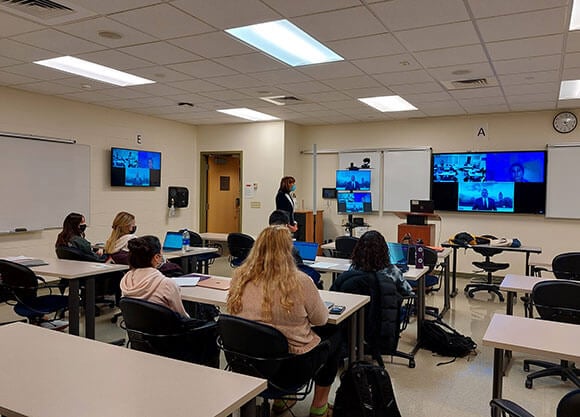
U.S. Secretary of Education to Quinnipiac students, ‘you will change lives’
December 07, 2021

December 07, 2021

During their Zoom meeting, Secretary Cardona answered questions related to proposed reform measures and shared his expertise and passion for public education.
“I always wanted to serve my community. I wanted to be a teacher, and that was it. To me, it is the bravest job,” said Cardona. “You have an opportunity to really impact children in ways that they’ll remember forever. You’re going to change lives, especially if you keep relationships at the heart of your journey as an educator. It’s the best job out there.”
Calling on Zoom from the White House National Tree Lighting Ceremony on Thursday, December 2, Cardona stood before the Washington Monument and responded to questions submitted by the students as a part of their classroom assignment. Cardona’s nephew is one of the 11 future educators currently enrolled in Larkins-Strathy’s class, all of which have plans to teach in public education after graduation.
“It’s a hard time to get into education because of the challenges of the pandemic,” said Cardona. “But it’s also the best time because your impact will be more meaningful than ever before.”
Expanding on hardships intensified by the pandemic, sophomore Marisa Markos asked Cardona to share his thoughts on supporting a funding increase for counselors, school nurses and social workers to help provide additional support for children who fall behind.
“The American Rescue Plan included $130 billion for schools with the intention to do more for the social and emotional well-being of our students,” said Cardona. “We know our students need it, and I think it’s long overdue in education.”
Miguel Cardona was sworn in as the 12th Secretary of Education on March 2, 2021, after serving as the Commissioner of Education in Connecticut since August 2019. Cardona has two decades of experience as a public-school educator in Meriden, Connecticut. He began his career as an elementary teacher.
After researching past and current reform measures, the students were tasked with writing a persuasive letter to the U.S. president and secretary of education to encourage them to consider several educational reforms. For the students, the assignment was an opportunity to study the demographics and trends of the public education system and expand their knowledge beyond the classroom.
“During this assignment, we researched and developed a deeper understanding of the material, more than a quiz would’ve provided,” said Markos. “We all want to be teachers, so it’s important to understand the past and current climate, as well as the future issues we’re going to confront in our lives as educators.”
For sophomore Scott Tuohy, the letter-writing exercise was an opportunity to turn coursework into political action.
“We didn’t know Dr. Cardona would be speaking to our class when we first started our research,” said Tuohy. “But just thinking that our letters might be read by those making decisions gave us the motivation to research and voice our opinions. We really felt like our concerns might be addressed.”
Another issue proposed by the students included channeling funding to provide additional meals for students in school. According to Professor Larkins-Strathy, the exercise in public policy will help students build an awareness of current functions, past trends and future expectations of educators.
“How many undergraduate students can say they talked directly to the Secretary of Education during their class? I think this is a powerful experience,” said Larkins-Strathy. “The assignment is a way for them to use their knowledge to positively impact the U.S. education system they are about to join.”
The students were joined by School of Education Dean Anne Dichele, who echoed Cardona’s message that education is built on relationships. She also reminded students that as educators, their role will be to serve as an advocate for students, families, colleagues and the community they serve.
“Teaching is about relationships. That is a key aspect. But it’s also political,” said Dichele. “I think it’s important you recognize it’s not just about the classroom. It’s not just about the kids. It’s about the impact a school has on its surrounding community. You are committing to a public service job. And the community you serve is more than just your classroom.”
Quinnipiac Today is your source for what's happening throughout #BobcatNation. Sign up for our weekly email newsletter to be among the first to know about news, events and members of our Bobcat family who are making a positive difference in our world.
Sign Up Now